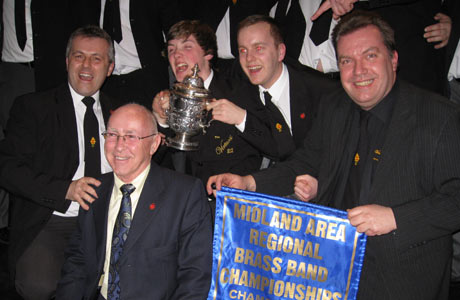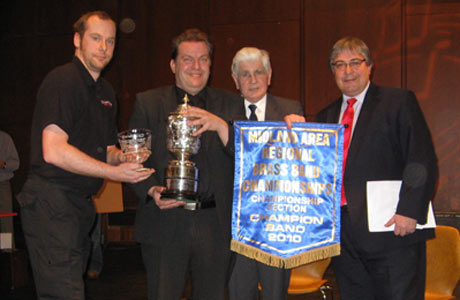2010 Midlands Regional Championship - Championship Section: retrospective
19-Mar-2010Six years of hurt was put behind them at the weekend as Virtuosi GUS once again claimed the bragging rights in the Midlands.

Return to winning ways: Virtuosi GUS celebrate in Bedworth
Picture: Chris Thomas
It seems hard to believe that it was way back in 2004 that Virtuosi GUS last reigned as the Midland Champion. On that occasion they were conducted by David Stowell in the band’s former life as Travelsphere Holidays.
It’s seems a long time ago now.
Wilderness years
The wilderness years have not always been easy for a band with a proud and illustrious history. Only in 2008 when coming runner up to Desford did they make the journey to the Royal Albert Hall, and that was followed by a disappointing result in Bedworth last year when a highly fancied performance failed to be rewarded.
However, 2009 proved to be a year of resurgent form, as they claimed the runner up spot at the Grand Shield securing a return to the British Open after a gap of six years.
Breakthrough
The band’s victory in Bedworth then will have felt like a further breakthrough.
John Berryman, the illustrious former principal cornet player with the band, presiding over a thoughtful, detailed performance of ‘English Heritage’ that prompted adjudicators David Read and Bob Childs to comment that this was playing of, “…a very high standard indeed”, even though many in the audience, had the final result down as a very close call.
Intriguing
The contest story unfolded from an intriguing draw which saw the pre-contest favourites Desford and Virtuosi GUS take to the stage early, playing second and third respectively.
With Stephen Roberts continuing his renewed acquaintance with the band, Desford immediately set an impressively high standard, with an incisive opening, terrifically rich sounds from the bass end, and a beautifully dreamy atmosphere in the Poco lento.
Clarity of detail in the cornet semi quaver passage work was excellent, although a couple of minor, yet potentially, costly individual slips in the Moderato and Largo might just have cost, as did a loss of co-ordination between Eb bass and the band in the solo passage from the Tempo 1.
A fine performance it was, but one, which also left the door slightly ajar for the bands that, followed.
As one Desford member commented after the contest, the important thing was to get to London - but second place will have hurt nonetheless.
Meant business
Whether word of Desford’s performance had got backstage to Virtuosi GUS or not is uncertain, but it was clear from the start that the band meant business.
From a technical point of view they produced the neatest ensemble work of the day through the early part of the work, although it did not quite match the atmosphere of Desford in the quieter sections.
The band sound though was the vintage GUS of yesteryear; bold, yet warm and beautifully balanced whilst not for the first time, James Fountain proved himself to be a terrific asset in the principal cornet chair.
The Un pochissimo meno mosso demonstrated a terrific swagger and led to a majestic conclusion that left an overall impression of a high quality performance but not without minor lapses.

Picking up the silverware: The judges hand the top prize to Virtuosi GUS
Picture: Chris Thomas
Sovereign standard
It was not until Sovereign that any of the other competing bands were able to get close to the early standard set by Desford and GUS.
Talk had been rife in the hall pre-contest about the difficulties faced by them in the days before the contest, with five players reportedly failing to get their registrations through in time.
Consequently, it was undoubtedly something of a patched up band, yet what had not been taken into account by many was the “Major” factor.
Greats
If ever evidence were needed of the respect felt by players for one of the true greats of banding it was on display here, and resulted in a performance that given the circumstances, saw Sovereign play out of its skin.
Peter Parkes drew playing of real character, so much so that on a different day it could well have been a victorious.
At times it was full on, in your face stuff, but the semi quaver detail in the cornets was often first class and the Largo was exquisite. Although the principal cornet battled slightly in the Vivo and a missed timpani entry (the player was running across the back of the band to retrieve the whip at the time) left a hole in the texture at a critical moment, it was a performance that left no doubt about its deserved place in the top three.
Where in the top three were Messrs Childs and Read going to place it though?
In the end they missed out, but despite not gaining qualification the result will have been of immense satisfaction to the players as well as Major Parkes himself.
As he commented with a twinkle in his eye to 4BR after the results “…it’s the musicality that I’m good at!”
More certain
Slightly more certain of its final position was Newstead under the direction of Duncan Beckley.
As the penultimate band, there was still an opening to make an impression, and following a good opening, Newstead demonstrated what a well prepared outfit it can be with careful attention to the detail of the score - albeit without that extra precision heard from the three front runners.
The Largo was marked by a genuine attempt to get down to the pp dynamics and although the Vivo threatened to run out of control at one point, they recovered to draw the piece to an exciting close.
Force five
In fifth, Thoresby Colliery under Melvin White showed that they can still be a force to be reckoned with in the Midlands region, although the detail and precision of ensemble was not quite secure enough to warrant a higher placing.
Tempi rocked somewhat on occasions and textures tended to the heavy side, although there were moments of impressive musicality on display in the Largo, particularly in the closing bars.
As David Read commented at the close, this was a day when unusually perhaps, it was the faster music rather than the slow music that divided the bands. Thoresby’s performance served to prove the point.
Credit
With two back row cornets missing as well as an Eb bass, Glossop Old deserve credit for achieving a creditable 6th place.
Phil Pavey made the most of a difficult situation by directing a performance of clear musical intent, although with the gaps in the ensemble it was inevitable that it was going to be mightily difficult for the players to fully match rivals in both sound and detail.
It was a very tired sounding band that reached the finishing post, but hardly surprising in the circumstances, and although many had the band placed lower in the final running order, there will be time to consolidate for Glossop ahead of the remainder of the contesting year.
Relief
Staffordshire’s 7th place under Huw Thomas will also have come as something of a relief after a lean period that possibly reached its lowest point last year in Bedworth.
Although uneven in execution, there were certainly occasional glimpses of the band that Staffordshire were a few years ago. They produced a good shape and flow in the Largo with excellent solo contributions, that although not always entirely involving, survived generally intact from serious incident.
It all got a touch harsh to close, but it might just be that Staffordshire is starting to build anew under Huw Thomas.
Dubious feat
Dave Lea and Jaguar (Coventry) has had its fair share of bad draws of late, pulling out number one in the Grand Shield last year and managing to repeat the dubious feat here in Bedworth.
After a clean start there was some scrappiness in the cornet section although the band’s flugel horn turned in some valuable individual work. Good sounds in the Largo led to a slightly scrambled Vivo, whilst there was a loss of motion through the Un Pochissimo meno mosso. A good conclusion however brought the performance to an enjoyable close and a certain mid-table finish.
Kibworth and Ratby Co-operative, finished in 9th and 11th respectively under John Hudson and Mike Fowles.
Tough going
Both bands found the going extremely tough at times and for Ratby the result is likely to signal First Section contesting in 2011.
For Kibworth it was a case of all volume and little subtlety, as they tried to make up for lack of detail with dynamics alone, whilst Ratby’s performance very nearly came off the rails in the Vivo, with the MD desperately trying to hold things together; a feat he ultimately managed to pull off - but only just.
For Championship Section newcomers Gresley Colliery and Phoenix West Midlands, ‘English Heritage’ proved to be something of a baptism of fire as both bands, despite battling manfully, found the demands of the score to great to make a real mark on the music.
Early signs
The early signs are that Gresley Colliery will survive to fight another Championship Section battle in Bedworth next year but for Phoenix, directed by Wes Kendrick following the departure of David Maplestone, the architect of the band’s meteoric rise through the sections, the early signs would indicate a swift return back to the First Section.
The subdued atmosphere at the results in Bedworth last year following disappointing performances all round was happily laid to rest as the players of Virtuosi GUS triumphantly held the Midlands trophy aloft amidst scenes of jubilation that six years of hurt had finally been put to rest.
Desford will reflect on an opportunity not quite fully seized, although the consolation of securing a spot at the Royal Albert Hall for the fourth consecutive year might just ease the disappointment.
X Factor
For Bob Childs, who commented that the adjudicators had been looking for the “X Factor” in the musicality of the playing, the performance of GUS and John Berryman clearly struck a resonating chord, although for many in the audience, this might just be remembered as one of the closest Midland finishes in recent years.
The thoughts of Virtuosi GUS, with the band safe in the knowledge that it has regained its places at both the Open and Nationals within the space of twelve months, will now switch to proving its ‘English Heritage’ on home ground when the Masters switches to its new Northamptonshire venue in May.
Kettering might just be back on the banding map.
Christopher Thomas















